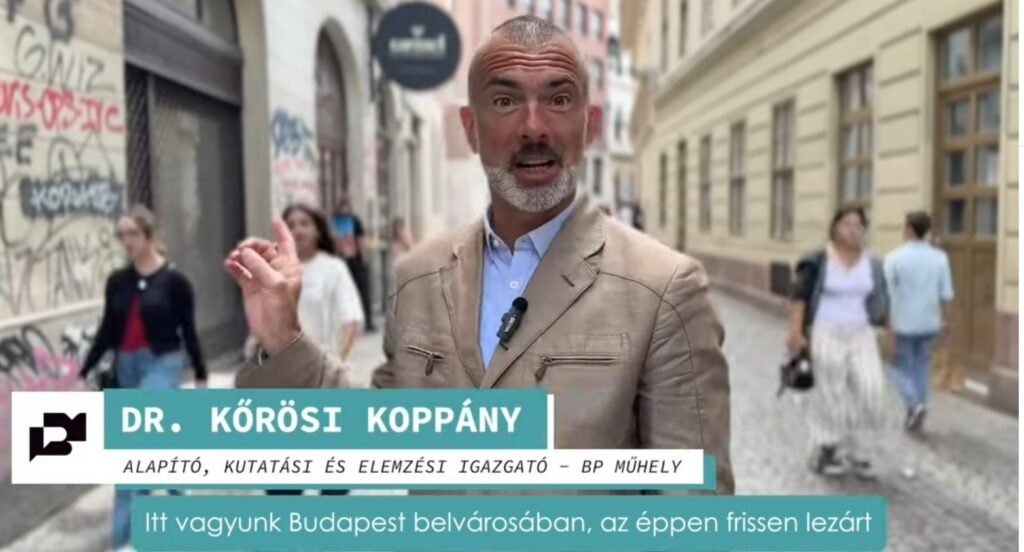The https://english.atlatszo.hu use cookies to track and profile customers such as action tags and pixel tracking on our website to assist our marketing. On our website we use technical, analytical, marketing and preference cookies. These are necessary for our site to work properly and to give us inforamation about how our site is used. See Cookies Policy
Think-tank of Fidesz loyalists received €6 million from public funds to campaign for a ‘Christian-conservative’ Budapest
Up-and-coming Fidesz loyalists serve in the key positions of freshly minted think tank BP Műhely. While the group curates a strictly non-ideological image in its public messaging, in documents filed to receive an outlandish government-financed grant they effectively promised to lead a ‘Christian-conservative’ political campaign in Budapest in the long lead-up to next year’s election – and beyond.
A newly established outfit masquerading as a nonprofit think‑tank has raised eyebrows in political and civic circles. Launched late las year under the moniker BP Műhely which echoes Budapest’s ubiquitous abbreviation, the organisation presents itself as ideologically neutral, positing that it aims to harness dispersed expert knowledge for the public good of the Hungarian capital.

Yet Átlátszó’s findings reveal a radically different story: the entity is, in fact, a political instrument funded to the tune of approximately €6.3 million, mounted to drive a ‘Christian‑conservative’ agenda across Budapest ahead of the anticipated 2026 parliamentary elections. Many Budapest locals, whose municipal government is led by liberal mayor Gergely Karácsony, are expected to vote for forces opposing Viktor Orbán’s right-wing government.
The organisation’s founder, Koppány Kőrösi, talking on national television in early July, portrayed BP Műhely as a collective of benign experts. “We’d rather be partners [with the city leadership]. We try to help by collecting [scattered knowledge] and provide proposals for the city administration – including the current city administration obviously – that could make the lives of locals better” – Kőrösi said.
However, Átlátszó gained access to grant documentation showing that, contrary to Kőrösi’s claims, the body explicitly intends to organise Budapest’s Christian‑conservative community, complete with polling, targeted surveys, consultations, media presence and a “Budapest Consultation” – activities that mimic political campaigning more than research.
Though newly founded, BP Városfejlesztési Műhely Nonprofit Kft. (BP Műhely) features well‑connected figures at its helm. Kőrösi – who owns the grant advisory company Hungaroconsulting Projektfejlesztő Kft. – doubles as a ‘development policy expert’ influencer on Facebook, where his page had already been recommended by the pro-government Megafon stable of influencers.
Executive roles of BP Műhely are occupied by CEO Krisztián Szabó (a former vice-president of Fidesz youth organization Fidelitas), strategic director Gergely Losonci (a political technologist with ties to the Századvég think tank and Orbán advisor Árpád Habony) and operations director Kristóf Heil (a law historian who used to work at the PM’s Office).
Key research personnel are chief expert Zsolt Wintermantel (a former Fidesz mayor of Budapest’s IV. District, who apparently still presides over the local party group) and research director Kornél Almássy (a former executive of companies owned by the Budapest administration who has ties to controversial businessman András Tombor). The supervisory board is no less politically embedded.
BP Műhely applied for its funding to the Batthyány Lajos Alapítvány (BLA)—a foundation tightly aligned with Fidesz leadership. Just weeks after its founding, BLA approved a contract to fully fund the organisation’s activities for the period February 2025 to March 2026, amounting to HUF 2.52 billion (approximately €6.3 million) – an endowment several magnitudes of order larger than what is normally available to independent Hungarian nonprofits.
This lifeline effectively ensures financial support spanning through to the expected next parliamentary election in April 2026, a stark indicator that BP Műhely is set to function as a quasi‑party apparatus, not an independent research hub.
Documents that BP Műhely provided BLA to secure grant funding – and to which Átlátszó gained access to – describe in detail the plans of the organization. BP Műhely envisions producing systematic district‑level polling, engaging in “research‑based public communication”, staging panel talks, publishing articles, rolling out an online “Budapest Consultation”, and flooding media through their own presence and via the use of influencers.
While these documents conveyed a sense of strong support for the capital’s Christian community, Budapest’s many residents of other religious persuasions, including its storied and significant Jewish community, did not receive any mention in the documents seen by Átlátszó.
The capital, according to a document outlining plans for grant-funded activities, is a “cultural and social enclave” inside Hungary, as “Christian-conservative ideals were not only put on the defensive [but] nearly disappeared from city institutions”. BP Műhely was formed “so that the immeasurably great intellectual power that the Christian-conservative community sporadically represents [in Budapest] would be united”, the document read.
Written and translated by Márton Sarkadi Nagy. The Hungarian version of this story is here. Cover photo: Koppány Kőrösi / BP Műhely.
Share:
Your support matters. Your donation helps us to uncover the truth.
- PayPal
- Bank transfer
- Patreon
- Benevity
Support our work with a PayPal donation to the Átlátszónet Foundation! Thank you.
Support our work by bank transfer to the account of the Átlátszónet Foundation. Please add in the comments: “Donation”
Beneficiary: Átlátszónet Alapítvány, bank name and address: Raiffeisen Bank, H-1054 Budapest, Akadémia utca 6.
EUR: IBAN HU36 1201 1265 0142 5189 0040 0002
USD: IBAN HU36 1201 1265 0142 5189 0050 0009
HUF: IBAN HU78 1201 1265 0142 5189 0030 0005
SWIFT: UBRTHUHB
Be a follower on Patreon
Support us on Benevity!

